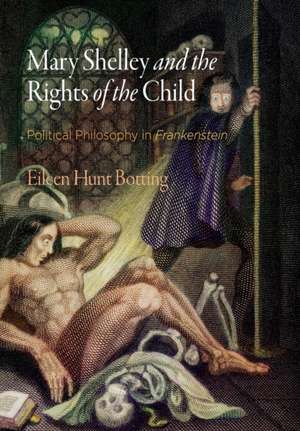Mary Shelley and the Rights of the Child – Political Philosophy in "Frankenstein": Haney Foundation Series
Autor Eileen M. Hunten Limba Engleză Hardback – 20 noi 2017
Botting contends that Frankenstein invites its readers to reason through the ethical consequences of a counterfactual premise: what if a man had used science to create a human life without a woman? Immediately after the Creature's birth, his scientist-father abandons him and the unjust and tragic consequences that follow form the basis of Frankenstein's plot. Botting finds in the novel's narrative structure a series of interconnected thought experiments that reveal how Shelley viewed Frankenstein's Creature for what he really was--a stateless orphan abandoned by family, abused by society, and ignored by law. The novel, therefore, compels readers to consider whether children have the right to the fundamental means for their development as humans--namely, rights to food, clothing, shelter, care, love, education, and community.
In Botting's analysis, Frankenstein emerges as a conceptual resource for exploring the rights of children today, especially those who are disabled, stateless, or genetically modified by medical technologies such as three-parent in vitro fertilization and, perhaps in the near future, gene editing. Mary Shelley and the Rights of the Child concludes that the right to share love and community, especially with parents or fitting substitutes, belongs to all children, regardless of their genesis, membership, or social status.
| Toate formatele și edițiile | Preț | Express |
|---|---|---|
| Paperback (1) | 181.61 lei 6-8 săpt. | |
| MT – University of Pennsylvania Press – 19 sep 2019 | 181.61 lei 6-8 săpt. | |
| Hardback (1) | 118.92 lei 3-5 săpt. | +27.18 lei 4-10 zile |
| MT – University of Pennsylvania Press – 20 noi 2017 | 118.92 lei 3-5 săpt. | +27.18 lei 4-10 zile |
Din seria Haney Foundation Series
-
 Preț: 282.33 lei
Preț: 282.33 lei -
 Preț: 276.86 lei
Preț: 276.86 lei -
 Preț: 258.91 lei
Preț: 258.91 lei -
 Preț: 160.77 lei
Preț: 160.77 lei -
 Preț: 277.49 lei
Preț: 277.49 lei - 11%
 Preț: 531.90 lei
Preț: 531.90 lei -
 Preț: 231.22 lei
Preț: 231.22 lei -
 Preț: 196.55 lei
Preț: 196.55 lei -
 Preț: 195.13 lei
Preț: 195.13 lei -
 Preț: 133.74 lei
Preț: 133.74 lei -
 Preț: 391.05 lei
Preț: 391.05 lei -
 Preț: 196.36 lei
Preț: 196.36 lei -
 Preț: 191.18 lei
Preț: 191.18 lei -
 Preț: 196.36 lei
Preț: 196.36 lei - 8%
 Preț: 489.33 lei
Preț: 489.33 lei -
 Preț: 213.69 lei
Preț: 213.69 lei -
 Preț: 205.05 lei
Preț: 205.05 lei -
 Preț: 203.33 lei
Preț: 203.33 lei -
 Preț: 241.95 lei
Preț: 241.95 lei -
 Preț: 434.76 lei
Preț: 434.76 lei -
 Preț: 434.76 lei
Preț: 434.76 lei -
 Preț: 348.36 lei
Preț: 348.36 lei -
 Preț: 468.04 lei
Preț: 468.04 lei - 11%
 Preț: 501.50 lei
Preț: 501.50 lei -
 Preț: 338.73 lei
Preț: 338.73 lei - 11%
 Preț: 502.86 lei
Preț: 502.86 lei - 11%
 Preț: 444.47 lei
Preț: 444.47 lei -
 Preț: 307.38 lei
Preț: 307.38 lei - 11%
 Preț: 441.03 lei
Preț: 441.03 lei -
 Preț: 312.21 lei
Preț: 312.21 lei -
 Preț: 379.13 lei
Preț: 379.13 lei - 11%
 Preț: 443.59 lei
Preț: 443.59 lei -
 Preț: 434.76 lei
Preț: 434.76 lei -
 Preț: 466.13 lei
Preț: 466.13 lei -
 Preț: 472.83 lei
Preț: 472.83 lei -
 Preț: 203.22 lei
Preț: 203.22 lei -
 Preț: 370.48 lei
Preț: 370.48 lei - 11%
 Preț: 502.86 lei
Preț: 502.86 lei - 11%
 Preț: 503.73 lei
Preț: 503.73 lei -
 Preț: 466.89 lei
Preț: 466.89 lei -
 Preț: 403.73 lei
Preț: 403.73 lei
Preț: 118.92 lei
Nou
Puncte Express: 178
Preț estimativ în valută:
22.76€ • 24.73$ • 19.13£
22.76€ • 24.73$ • 19.13£
Carte disponibilă
Livrare economică 31 martie-14 aprilie
Livrare express 14-20 martie pentru 37.17 lei
Preluare comenzi: 021 569.72.76
Specificații
ISBN-13: 9780812249620
ISBN-10: 0812249623
Pagini: 232
Dimensiuni: 161 x 237 x 24 mm
Greutate: 0.5 kg
Editura: MT – University of Pennsylvania Press
Seria Haney Foundation Series
ISBN-10: 0812249623
Pagini: 232
Dimensiuni: 161 x 237 x 24 mm
Greutate: 0.5 kg
Editura: MT – University of Pennsylvania Press
Seria Haney Foundation Series
Cuprins
Preface. Welcome to the Creature Double Feature
Introduction. Frankenstein and the Question of Children's Rights
Chapter 1. The Specter of the Stateless Orphan from Hobbes to Shelley
Chapter 2. Wollstonecraft's Philosophy of Children's Rights
Chapter 3. Shelley's Thought Experiments on the Rights of the Child
Chapter 4. Three Applications of Shelley's Thought Experiments: The Rights of Disabled, Stateless, and Posthuman Children
Notes
Index
Acknowledgments
Notă biografică
Descriere
In Mary Shelley and the Rights of the Child, Eileen Hunt Botting contends that Frankenstein is a profound work of speculative fiction designed to engage a radical moral and political question: do children have rights?
